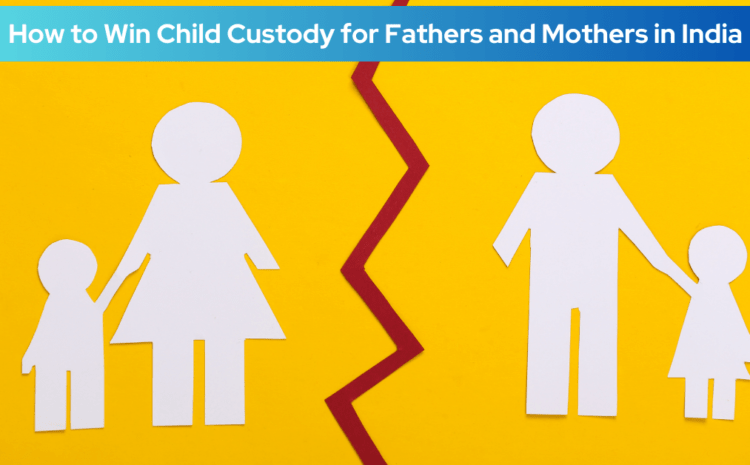
Child custody disputes in India are governed by the principle of the “welfare of the child” enshrined in various legal precedents. This guide delves into the intricacies of child custody battles in India, outlining the legal landscape for both fathers and mothers.
Understanding Child Custody in India
Child custody in India refers to the legal right of a parent to take care of their child after a divorce or separation. The custody includes the responsibility for the child’s upbringing, including their education, healthcare, and general welfare. Indian courts primarily consider the child’s best interests while deciding custody matters. Indian courts determine child custody arrangements based on the well-established principle of “parens patriae,” meaning the state acts as a parent for the protection of a minor child.
This principle is reflected in landmark judgments like Gita Mittal vs. Ramesh Kumar [(2010) 3 SCC 612], where the Supreme Court of India reiterated that the “dominant consideration” in all child custody matters is the “welfare and paramount interest of the child.” The court will meticulously evaluate a multitude of factors to determine the living arrangements that best serve the child’s physical, emotional, and psychological well-being.
These factors may include:
- The child’s existing relationship with each parent: The court will consider the child’s emotional ties, sense of security, and daily interactions with each parent.
- The ability of each parent to provide for the child’s needs: This encompasses financial stability, housing arrangements, access to quality education and healthcare, and the parent’s capacity to meet the child’s emotional and developmental needs.
- The mental and physical health of each parent: The court will assess any factors that could potentially impact the child’s well-being, such as a parent’s history of mental illness, substance abuse, or domestic violence.
- The child’s age and maturity level: The court may consider the child’s wishes, particularly if the child is above 13 years old and demonstrates sufficient maturity to express a well-considered preference, as discussed in the case of Hena Mittal vs. Rakesh Kumar (201816 SCC 234).
Challenges Faced by Fathers and Mothers in Child Custody Battles
1. Historical Societal Bias
Traditionally, mothers have been presumed to be the natural caregivers, often leading to an initial hurdle for fathers seeking custody. However, this trend is progressively changing. Judgments like Gautam Bhatia vs. Saraswati [(2014) 3 DHC 461], where the Delhi High Court awarded sole custody to a father, demonstrates a shift towards a more gender-neutral approach based on merit.
2. Evidentiary Burden
Both mothers and fathers have the legal burden of presenting compelling evidence to substantiate their claim as the more suitable custodian. This evidence can encompass financial records, housing arrangements, reports from educational institutions or mental health professionals, and documentation demonstrating their involvement in the child’s upbringing.
3. Emotional Toll
Child custody battles can be emotionally taxing for all parties involved, including the child. Both parents must prioritize the child’s well-being throughout the legal proceedings and avoid bad-mouthing the other parent in front of the child.
Understanding Legal Rights for Fathers and Mothers
The Guardians and Wards Act of 1890, the Hindu Minority and Guardianship Act of 1956, and the Divorce Act of 1869 (for Christian couples) are the primary legal frameworks governing child custody in India.
These statutes establish the following key principles:
- Equal Custody Rights: Both fathers and mothers possess equal legal rights to seek custody of their children.
- No Presumption of Sole Custody for Mothers: There is no legal presumption that automatically grants sole custody to the mother. Custody arrangements can be structured as:
- Sole Custody: One parent has primary physical custody of the child, with the other parent granted visitation rights.
- Joint Custody: Both parents share physical custody of the child, with a predetermined parenting plan outlining time-sharing arrangements.
- Visitation Rights: Even in cases where one parent has sole custody, the other parent typically retains visitation rights to maintain a relationship with the child.
A lawyer can provide tailored legal advice based on the specific facts of your case, navigate the complexities of the legal system, and ensure your rights are protected throughout the child custody proceedings.
Preparing for a Child Custody Battle in India
Having a strong legal strategy and comprehensive preparation are paramount for navigating a child custody battle in India. Here’s a breakdown of key steps to consider:
Gather Documents
Compile a comprehensive file of documents that bolster your claim as the more suitable custodian. This may include:
- Financial Statements: Paystubs, bank statements, and tax returns to demonstrate your financial stability and ability to provide for the child’s needs.
- Proof of Residence: Lease agreements, property ownership documents, or utility bills to establish a stable and secure living environment for the child.
- Employment Records: Letters of employment or work contracts to showcase your ability to maintain a consistent schedule and accommodate the child’s needs.
- School Records: Report cards, teacher evaluations, or extracurricular activity involvement documents to demonstrate your active participation in the child’s academic and extracurricular life.
- Medical Records: Documentation of any medical conditions you or the child may have, along with healthcare provider information.
- Character References: Statements from friends, family members, or childcare providers attesting to your parenting skills and positive relationship with the child.
Maintain a Stable Environment
If you are seeking custody, ensure you can provide a safe, nurturing, and well-maintained living environment for the child. This includes having adequate space, a child-proofed home, and access to necessary amenities.
Prioritize the Child’s Needs
Throughout the legal process, keep the child’s well-being at the forefront. Schedule your time that suits the child’s educational needs, physical activities, and social well-being. Avoid bad-mouthing the other parent or engaging in any behavior that could negatively impact the child’s emotional state.
Consider Mediation
Explore the possibility of mediation before resorting to litigation. Mediation is a collaborative process where a neutral third party facilitates communication between parents to reach a mutually agreeable custody arrangement outside of a courtroom setting. This approach can be less adversarial and minimize emotional distress for all parties involved, particularly the child. Discuss the possibility of co-parenting with the other parent to have an effortless transition for the child.
Who Wins the Most Custody Battles?
There’s no definitive answer to this question. The court adjudicates each case based on its unique circumstances and the “best interests of the child” principle. Recent trends indicate an increase in fathers being awarded sole or shared custody. However, statistics still suggest mothers are more likely to be awarded custody.
Factors Influencing Custody Decisions:
- The Strength of Each Parent’s Case: The quality and persuasiveness of the evidence presented by each parent significantly impact the court’s decision. A well-prepared case with compelling documentation supporting your ability to provide a nurturing and stable environment for the child strengthens your position.
- The Child’s Age and Wishes: While not the sole determining factor, the court may consider the wishes of a mature child, typically above 13 years old. The court will assess the child’s maturity level and understanding of the situation before giving weight to their preference.
At What Age Can a Child Decide Custody in India?
Indian courts do not have a set age at which a child’s decision becomes the sole determinant in custody battles. However, the court recognizes the evolving maturity of children. It may consider their wishes, particularly if the child is above 13 years old and demonstrates a sufficient understanding of the situation and the potential consequences of their preference, as discussed in Hena Mittal vs. Rakesh Kumar (2018 16 SCC 234). The court will evaluate the child’s capacity for thoughtful consideration and base its decision on what truly serves the child’s best interests.
Conclusion
Child custody battles in India can be complex and emotionally challenging. By understanding your legal rights, meticulously gathering evidence, prioritizing your child’s well-being, and seeking guidance from a qualified family law advocate, you can increase your chances of a successful outcome. Remember, the ultimate objective is to create a custody arrangement that fosters the child’s emotional, physical, social, and psychological well-being and ensures their happiness and development in a secure and loving environment.

Advocate Kiran S R – A highly skilled, passionate, dedicated advocate, with vast wealth of knowledge, professionalism, ethical approach and expert skills. One of the sharpest legal mindset brings the best principles of legal practice to the forefront. A qualified Engineer turned Advocate. His passion, dedication and vision to help and assist his clients achieve the best results is his driving force.

